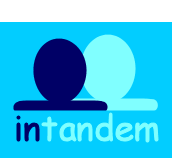I have been a qualified British Sign Language/English interpreter since 2008 – however, since professional supervision is not mandatory within interpreting, it was some time into my career before I came across it. When I did embark on a supervisory relationship, the value of my monthly sessions became apparent very quickly, and this led me to undertake a Diploma in Supervision to become a supervisor myself, qualifying in 2018.
About two years into my supervision practice a colleague introduced me to the intandem training courses and workshops. While, like all professional supervisors, I receive regular supervision for my work, I really welcomed the opportunity to do some refresher training with a group of supervisors from all over the country and from other professions.
I have now engaged with a number of intandem courses and workshops and found them to be a terrific way to reinvigorate my practice. They have introduced me to some new theoretical learning to underpin and compliment theories I was already familiar with, and exposed me to fresh perspectives from fellow supervisors. The trainers offer ideas for different and creative ways of working and always allow plenty of opportunity for discussion during which participants generously share their thoughts and experiences, all of which has helped instigate new thoughts and understanding.
Practising
A specific element of the training offered is live practice, which is such a rare opportunity post qualifying. An initial feeling of dread, having to ‘perform’ as supervisor/supervisee or observer’ in front of colleagues is soon replaced with a feeling of safety and support and the recognition that being able to practise supervision is a gift! How wonderful to be in a situation where you can really be bold to try new things and feel more confident in fully trusting the process. Participating in this practice has sharpened my focus. The feedback offered helps me to understand my tendencies and recognise when and why elements of my supervision practice prove useful and when there might be an opportunity to rephrase certain things, or try a different approach to better effect. In the role of observer, I can witness colleagues with different ways of working and notice the value of these or consider possible alternative interventions that might land more usefully.
I used one of these sessions to practise supervising without writing reams of notes. A fear of forgetting detail whilst listening to supervisees meant I was accustomed to being tied to my pen and notebook. However, I was aware that this desire to capture everything was in fact causing my focus to become a little split. By safely trialling supervising without a pen/notebook in my hand I experienced first hand the value of being 100% focused on the communication from my supervisee, and I now had reassuring proof that I was able to recall important and relevant things from the session without any notes.
Less is more
A recent Advanced Supervision Skills workshop provided me with a further significant moment – the strong reminder that less can often be more. We observed a pre-recorded session which focused on listening and reflecting the supervisee. This demonstration resonated with me as I am aware that I can often feel a pull to produce wordy and detailed interventions, perceiving them as more valuable, when in fact a simple and, you could say, small offering can be more impactful. Echoing the supervisee’s words back to them not only allows them to know they’ve been heard, it can often slow them down and create fertile ground for deeper reflections – leading them to find their own fresh insight.
In addition to the benefits to the supervisee, I have found that drawing on the ‘reflecting’ technique in my supervision practice is a really effective way of focusing my deep listening, thereby enabling me to truly inhabit the supervisee’s world. This, along with my newfound confidence in supervising without writing copious notes, is now a regular characteristic of my practice and I have noted how much more connected I feel to my supervisees as a result.
Participating in these workshops is, to my mind, tantamount to a day-long supervision session. By committing my time I am giving myself the opportunity to pause and look at my supervision work in depth with the guidance and encouragement of experienced facilitators. It is the value of this time and space that allows for detailed reflection as I step away from my work and look at it differently, thereby gaining clarity and fresh perspectives. Despite being in a group of mostly unknown others, intandem creates a safe space, allowing me to feel comfortably vulnerable, and these are conditions that foster growth and development. The workshops refocus and enliven my practice and, as I now approach five years of working as a supervisor, I look forward to engaging in more.
By Mariella Reina
e) mariellareina8@gmail.com
w) www.interpretingbsl.com

